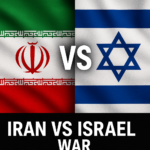The Iran-Israel war has already gone into the eighth day as the military exchanges get more serious and the regional instability increases. Israel has conducted several airstrikes throughout the night to bombard Iranian nuclear and missile-sector installations including the Arak heavy water reactor. The state media in Iran said that the facilities at Arak were evacuated prior to the attack and there was no radiation risk. At the same time, Iran unleashed a salvo of missiles and drones into Israel, striking two major cities of Tel Aviv and Beersheba in the south. Soroka Medical Center, the largest hospital in southern Israel was one of the most devastating attacks as a result of which large numbers of people died and aroused the international community to condemn the equal power of response. The total number of those injured in Israel since the beginning of the conflict amounts to more than 270 people. Since Sunday, Iran has not given updated casualty figures.
Israeli leaders have indicated that a big jump in their goals has taken place. The defense minister, Israel Katz, directly accused the Supreme Leader of Iran, Ayatollah Ali Khamenei of the attacks and publicly declared that the Israel military had been ordered to make him cease to exist. Destroying Iranian nuclear program and taking action against the people in power seems to be added to the operational objectives of the IDF. It is reported that Israeli air force operation targeted central Iran intelligence sites, air defense as well as Iranian missile launch areas. In retaliation, Iran fired ballistic missiles on Israel with Fateh-110 rockets and Shahed drones causing damage to Israeli infrastructure and cities.
The damaged but effective Iranian nuclear program is in operation. As much as the Arak reactor was targeted, there has been no report of the leak of radiation, and also other enrichment facilities such as the Natanz and Fordow have not been reported as destroyed. Iran keeps refuting its intentions to develop nuclear weapons. Monitors at the U.N. International Atomic Energy Agency (IAEA) have not yet published revised evaluations, nevertheless, Israeli attacks caused considerable interference judging by their magnitude. The messages Tehran gives are recalcitrant and yet the country, it has warned, would further involement in its internal affairs by external forces especially the American would cause a wide spread regional confrontation.
The role of the US is still unclear. President Donald Trump would determine in the next two weeks on whether the US would interfere militarily. Regardless of mounting domestic pressure, the administration is still indulging in a back-channel negotiation with Iran using emissary Steve Witkoff. The relocation of military troops in the area indicates the possibility of action, as now the USS Dwight D. Eisenhower can be seen at the Persian Gulf, and the CENTCOM remains on alert. Trump advisors still believe that he has an opportunity to attain strategic objectives using negotiations and not force.
Reactions across the world are not universal. China and Russia have urged de-escalation immediately, threatening to attack civilian and nuclear targets. Much to the disdain of EU, the strike was carried out against Soroka hospital and EU appealed to both sides to accept ceasefire. UN Security held an urgent meeting but their resolution was not attained. In the meanwhile non-state actors loyal to Iran have started to mobilize. Hezbollah rockets were fired into northern Israel after attacking southern Lebanon by rocket fire and helped by Israeli retaliatory fire with artillery. This has further destabilized maritime routes as Houthi rebels in Yemen took responsibility of missile attacks on Red Sea shipping.
Regional war now seems to be a serious threat more than it has been in the past 10 years. Gulf nations such as Saudi Arabia and the UAE have strengthened their military levels and mobilized their missile defense systems in the region. The oils on the international market have shot up, with the Brent crude increasing by 11 per cent in the last week. Sanctions talks resume in Washington in voice against Iran oil exports. Engagement of the US on the military front will mean drawing in the rest of the states such as Iraq, Syria, Lebanon, with even Pakistan being drawn into it. This would irreparably change the security framework of the Middle East and would suspend any movement on the issue or diplomatic normalization in the region.
https://appsumo.com/profile/qmanager/
https://www.dcfever.com/users/profile.php?id=1230395
https://www.buzzfeed.com/qmanagerindia
https://imgur.com/user/qmanager/about
https://us.community.sony.com/s/profile/005Dp000004eCTH?language=en_US
https://www.yumpu.com/user/qmanager
https://alphacoders.com/users/profile/337609?success_message=Your%20Link%20Has%20Been%20Added!
https://www.prestashop.com/forums/profile/1913211-qmanager/#google_vignette
https://wellfound.com/u/qmanager-india
https://moodle.org/user/profile.php
https://www.atlasobscura.com/users/qmanager
https://forums.soompi.com/profile/1598176-qmanager/?tab=field_core_pfield_11
https://superuser.com/users/2480919/q-manager
https://www.bitchute.com/profile/ZPWEY5rTuKbB
https://forum.audacityteam.org/u/qmanager/activity
https://forum.astronomy.com/u/qmanager/activity
https://reactormag.com/members/qmanager/
https://www.giveawayoftheday.com/forums/profile/275824
https://play.eslgaming.com/player/20589643/
https://www.kongregate.com/accounts/qmanagerindia
https://jobs.newtimes.co.rw/employers/2d277e92-917f-46fa-83bd-01eef2d521e8/dashboard
https://www.alltrails.com/members/namste-yogesh/about
https://www.metal-archives.com/users/qmanager
https://thegadgetflow.com/user/namsteyogesh/
https://queue-manager.webflow.io/
https://gifyu.com/namsteyogesh
https://bbpress.org/forums/profile/qmanager/
https://www.dead.net/member/qmanager
https://jobs.blooloop.com/profiles/6230312-qmanager-india
https://www.sbnation.com/users/qmanager
https://www.hackerrank.com/profile/namsteyogesh
https://jobs.cncf.io/profiles/6257155-q-manager-india
https://jobs.citylimits.org/profiles/6257266-q-manager-india
https://www.interweave.com/plus_old/members/qmanager/profile/
https://mx3.ch/qmanager
https://ronpaulforums.com/members/qmanager.343186/#about
https://chatroll.com/profile/qmanager01
https://www.flipsnack.com/E9FBD977C6F/buy-queue-manager-online-premium-crowd-control-solutions/full-view.html
https://www.nairaland.com/qmanager
http://www.indiacatalog.com/yellow_pages/yp_detail.php?id=141206
https://www.apexarticle.com/author/qmanager/
https://www.udrpsearch.com/user/qmanager
http://jobboard.piasd.org/author/qmanager/
https://adsnity.com/author/qmanager/
https://2024.hackerspace.govhack.org/profiles/q_manager
https://techplanet.today/member/queue-manager
https://owntweet.com/qmanager
https://subscribe.ru/author/31870548
https://www.outdoorproject.com/users/seo-smartkey
https://forum.asustor.com/memberlist.php?mode=viewprofile&u=16681
https://fairygodboss.com/users/profile/t13qXnMIB6/qmanagert
https://www.bikemap.net/en/u/namsteyogesh/routes/created/
https://etherscan.io/public-profile?uid=5ed920f
https://www.hogwartsishere.com/1680800/
https://www.thehockeypaper.co.uk/forums/users/qmanager
https://forums.autodesk.com/t5/user/viewprofilepage/user-id/17278223
https://www.geogebra.org/u/qmanager#people
https://a.pr-cy.ru/www.q-manager.com/
https://minne.com/@qmanager/profile
https://hugsqueeze.com/qmanager
https://kahkaham.net/qmanager01
https://www.soshified.com/forums/user/616141-qmanager/
https://www.zerohedge.com/user/4pjkTKcEgygezbCHsEQ0bXWip0i1
https://moz.com/community/q/user/qmanager01
https://owntweet.com/qmanager/
https://slideslive.com/jkpgnxdsji7q?tab=about
https://shopperboard.com/namsteyogesh
https://theamberpost.com/member/qmanager
https://codeberg.org/qmanager
https://www.guydemarle.com/profil/qmanager-141282
https://www.catapulta.me/users/q-manager
https://fun4friends.com/profile-3518933
https://ok.ru/profile/910134214742/statuses/158130640100694
https://www.ameba.jp/profile/general/qmanager/?account_block_token=AYWq2TtHytwaMLrp3n21NpHumCD6xTJH
https://participacion.cabildofuer.es/profiles/qmanager/activity?locale=en
https://log.concept2.com/profile/2510468
https://www.cartoonmovement.com/cartoonist/36276
https://businessleed.com/author/qmanager/
https://www.fiferosdevenezuela.com/foro/member.php?action=profile&uid=10198
https://www.indiegogo.com/individuals/38632129
https://creativemarket.com/users/qmanagerindia
https://tinyurl.com/q-manager
https://tinyurl.com/que-manager-products
https://www.wikihow.com/User:Qmanager
https://hotavn.com/profile?acc=qmanager
https://www.undrtone.com/qmanager
https://www.openstreetmap.org/user/q%20manager
https://www.intensedebate.com/people/qmanagerindia
https://www.walkscore.com/people/110167991616/qmanager
https://hire.digitalscholar.in/candidate/namsteyogesh/
https://decidim.rezero.cat/profiles/qmanager/activity








